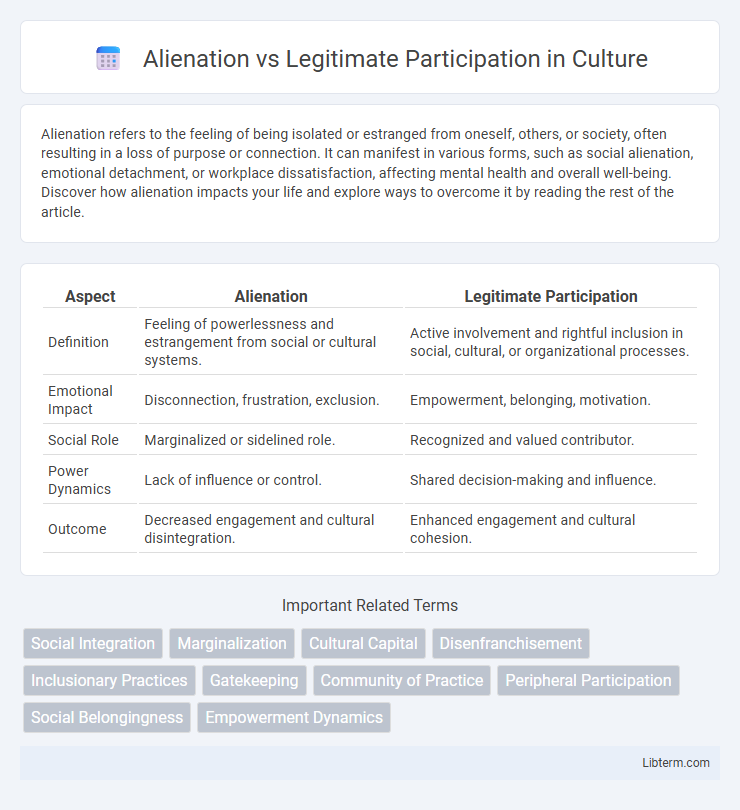Alienation refers to the feeling of being isolated or estranged from oneself, others, or society, often resulting in a loss of purpose or connection. It can manifest in various forms, such as social alienation, emotional detachment, or workplace dissatisfaction, affecting mental health and overall well-being. Discover how alienation impacts your life and explore ways to overcome it by reading the rest of the article.
Table of Comparison
| Aspect | Alienation | Legitimate Participation |
|---|---|---|
| Definition | Feeling of powerlessness and estrangement from social or cultural systems. | Active involvement and rightful inclusion in social, cultural, or organizational processes. |
| Emotional Impact | Disconnection, frustration, exclusion. | Empowerment, belonging, motivation. |
| Social Role | Marginalized or sidelined role. | Recognized and valued contributor. |
| Power Dynamics | Lack of influence or control. | Shared decision-making and influence. |
| Outcome | Decreased engagement and cultural disintegration. | Enhanced engagement and cultural cohesion. |
Understanding Alienation in Social Contexts
Alienation in social contexts refers to the estrangement individuals feel when disconnected from meaningful participation in communal or organizational activities. This sense of isolation undermines personal identity and social cohesion, often resulting from lack of recognition, exclusion, or powerlessness. Understanding alienation requires examining structural barriers and psychological impacts that inhibit authentic engagement within social systems.
Defining Legitimate Participation
Legitimate participation refers to the active, recognized involvement of individuals or groups within social, political, or organizational systems where their voices are acknowledged and have genuine influence on decision-making processes. It contrasts with alienation by fostering a sense of belonging, empowerment, and validation, ensuring stakeholders contribute meaningfully to outcomes. Legitimate participation is characterized by transparency, inclusiveness, and accountability, which collectively enhance democratic engagement and social cohesion.
Historical Perspectives on Alienation and Participation
Historical perspectives on alienation trace back to Karl Marx's analysis of worker detachment from production under capitalism, highlighting the loss of control and meaning in labor. Legitimate participation evolved from democratic theories emphasizing individual agency and collective decision-making in political and social systems. Scholars contrast alienation as a state of powerlessness with participation as a mode of empowerment, shaping debates in sociology and political science.
Key Differences Between Alienation and Legitimate Participation
Alienation refers to a sense of powerlessness and disconnection from decisions or social systems, often causing disengagement and frustration. Legitimate participation involves meaningful involvement in decision-making processes, ensuring individuals have recognized rights and influence within organizations or communities. Key differences lie in the level of recognition and agency, where alienation denotes exclusion and lack of control, while legitimate participation signifies inclusion, empowerment, and active contribution.
Causes of Alienation in Modern Society
Rapid technological advancements, economic inequality, and social fragmentation significantly contribute to alienation in modern society by disconnecting individuals from meaningful work and community engagement. The rise of consumer culture and digital communication often fosters superficial interactions, undermining genuine participation and engagement in civic life. Structural barriers such as unemployment, political disenfranchisement, and cultural homogenization further intensify feelings of powerlessness and social isolation.
Pathways to Foster Legitimate Participation
Pathways to foster legitimate participation involve creating transparent decision-making processes that ensure inclusivity and equal representation of diverse stakeholders. Establishing trust through consistent communication and accountability mechanisms enhances community engagement and reduces feelings of alienation. Empowering individuals with accessible resources and clear avenues for meaningful input strengthens the legitimacy of participatory practices.
Societal Impacts of Alienation vs. Engagement
Alienation leads to social fragmentation, increased distrust, and reduced civic participation, which weakens community cohesion and hinders democratic processes. Legitimate participation fosters social inclusion, empowerment, and collective problem-solving, enhancing social capital and promoting equitable policy outcomes. Empirical studies reveal that societies with higher engagement levels experience improved mental health, economic development, and resilience against social unrest.
Overcoming Barriers to Participation
Overcoming barriers to participation involves addressing feelings of alienation by fostering inclusive environments and promoting genuine engagement in decision-making processes. Empowering marginalized groups through accessible resources, transparent communication, and supportive networks enhances legitimate participation and mitigates exclusion. Implementing targeted policies that recognize diverse needs and encourage active involvement drives equitable participation and community cohesion.
Case Studies: Real-World Examples
Case studies demonstrate that alienation often manifests in workplace environments where employees feel disconnected from decision-making processes, such as in large-scale manufacturing plants where hierarchical structures limit individual input. In contrast, legitimate participation is illustrated by examples like Scandinavian cooperative businesses, where inclusive governance models empower workers and foster engagement, leading to higher job satisfaction and productivity. Empirical data from these case studies reveal that organizations embracing participatory practices experience lower turnover rates and enhanced innovation compared to those characterized by alienation.
Strategies for Promoting Inclusion and Belonging
Promoting inclusion and belonging involves implementing strategies such as fostering open communication, encouraging diverse perspectives, and creating equitable opportunities for engagement in organizational or community settings. Emphasizing social support networks and recognizing individual contributions reduces feelings of alienation and enhances legitimate participation. Structured mentorship programs and inclusive policy development are effective tools to cultivate a culture of belonging and active involvement.
Alienation Infographic

 libterm.com
libterm.com